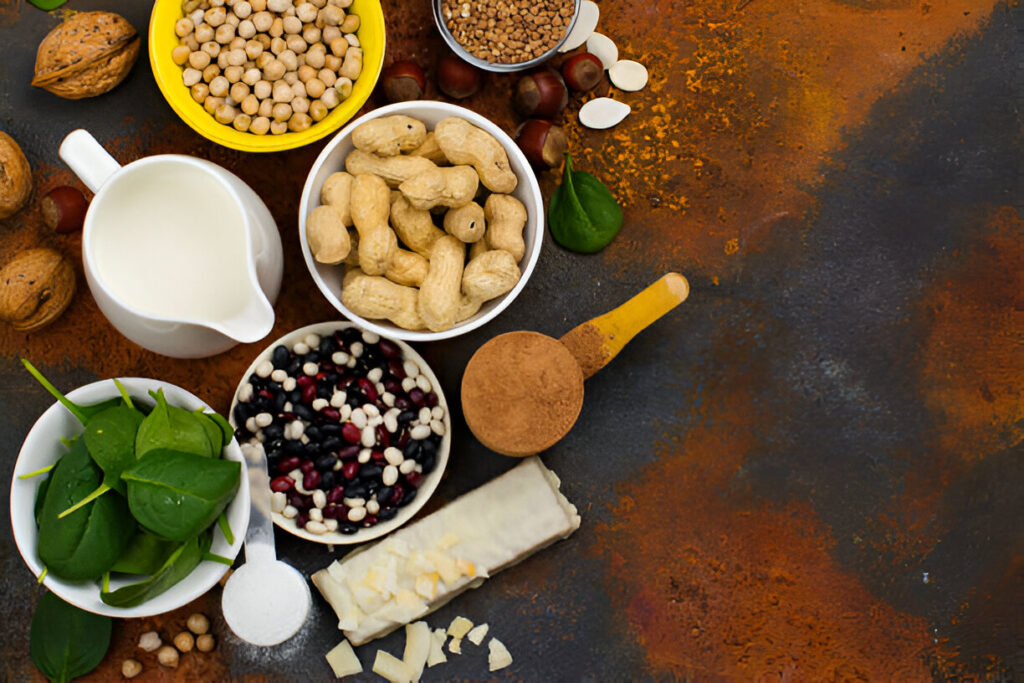
The rising interest in plant-based nutrition has sparked a crucial question among fitness enthusiasts: Can you effectively build muscle on a vegan diet? The answer is a resounding yes, and I’ll show you exactly how to do it through optimal protein sources and evidence-based strategies.
Why Vegan Protein Sources Matter for Muscle Growth
As someone who’s helped numerous clients transition to plant-based diets while maintaining their fitness goals, I can attest that proper protein intake is crucial. The key is understanding which vegan foods pack the most protein punch and how to combine them effectively.
The Science Behind Plant Protein and Muscle Synthesis
Research published in the Sports Medicine Journal (source) demonstrates that plant-based proteins can be just as effective as animal proteins for muscle growth when properly combined and consumed in adequate amounts. The key is ensuring you get all essential amino acids through varied sources.
Top Vegan Protein Sources for Muscle Building
1. Legumes: The Foundation of Plant-Based Protein
- Lentils (18g protein per cup)
- Red lentils
- Green lentils
- Black lentils
- Benefits: High in iron and fiber
- Best uses: Soups, curries, and salads
- Chickpeas (15g protein per cup)
- Versatile protein source
- Rich in manganese and folate
- Great for muscle recovery
2. Complete Protein Sources
Quinoa (8g protein per cup)
Unlike most grains, quinoa contains all nine essential amino acids, making it a complete protein source. It’s also rich in:
- Iron
- Magnesium
- Complex carbohydrates
Soy Products
- Tempeh (31g protein per cup)
- Fermented soy product
- Better protein absorption
- Probiotic benefits
- Tofu (20g protein per cup)
- Versatile cooking options
- Different firmness levels
- Calcium-fortified varieties available
3. Plant-Based Protein Powders
- Pea Protein
- 24-28g protein per serving
- High in BCAAs
- Excellent digestibility
- Hemp Protein
- 15-20g protein per serving
- Rich in omega-3 fatty acids
- Contains fiber and minerals
Optimal Combinations for Maximum Muscle Growth
Creating synergistic protein combinations can enhance amino acid profiles:
- Quinoa + Black Beans
- Lentils + Brown Rice
- Chickpeas + Whole Wheat Pita
- Tempeh + Sweet Potato
Meal Planning for Muscle Gain
Sample Daily Meal Plan
Breakfast:
- Protein smoothie (30g protein)
- Plant protein powder
- Banana
- Spinach
- Almond milk
- Chia seeds
Lunch:
- Buddha bowl (25g protein)
- Quinoa base
- Roasted chickpeas
- Steamed broccoli
- Tahini dressing
Dinner:
- Tempeh stir-fry (35g protein)
- Marinated tempeh
- Brown rice
- Mixed vegetables
- Cashews
Supplementation Considerations
While whole foods should be your primary source, consider:
- Vitamin B12
- Vitamin D
- Iron
- Zinc
Expert Tips from Plant-Based Athletes
According to professional vegan bodybuilder Brian Turner (Instagram), consistency and variety are key: “Focus on whole foods and don’t fear carbs – they’re essential for muscle growth.”
Common Challenges and Solutions
- Protein Absorption
- Solution: Combine different protein sources
- Add digestive enzymes when needed
- Proper food preparation techniques
- Caloric Intake
- Solution: Include calorie-dense foods
- Track macros initially
- Eat more frequently if needed
FAQ Section
1. Can I build muscle as effectively on a vegan diet?
Yes, numerous studies have shown comparable muscle growth results between plant-based and omnivorous diets when protein intake is adequate. A 2021 study in the Journal of Sports Science found no significant difference in muscle gain between vegan and non-vegan athletes following a structured resistance training program.
2. How much protein do I need as a vegan athlete?
The recommended protein intake for vegan athletes aiming to build muscle is 1.6-2.0g per kg of body weight. This is slightly higher than for non-vegan athletes to account for the lower digestibility of some plant proteins. For a 70kg individual, this means consuming 112-140g of protein daily.
3. Should I worry about protein combining at every meal?
While it’s not necessary to combine proteins at every single meal, ensuring you get a variety of protein sources throughout the day is important. Your body maintains an amino acid pool that it can draw from, so focus on daily intake rather than per-meal combinations.
4. What are the best post-workout vegan protein sources?
Fast-absorbing options include:
- Pea protein shake
- Soy milk with banana
- Sprouted grain bread with hummus
- Rice protein blend
5. Are there any potential nutrient deficiencies I should watch for?
Key nutrients to monitor:
- Vitamin B12 (supplement recommended)
- Iron (combine with vitamin C for better absorption)
- Zinc (focus on legumes and nuts)
- Omega-3s (consider algae-based supplements)
Community Success Stories
From the r/veganfitness community on Reddit, user VeganGains2024 shares: “I’ve gained 15lbs of muscle in 8 months on a fully vegan diet. The key was hitting my protein goals consistently and following a progressive overload program.”
Resources and Further Reading
- Examine.com’s Protein Research
- Academy of Nutrition and Dietetics Position Paper
- PubMed Central – Vegan Nutrition Studies
Personal Recommendations
Having worked with various vegan athletes, I’ve found these strategies most effective:
- Start with whole foods before supplements
- Track protein intake for the first few weeks
- Prepare meals in advance
- Focus on variety rather than perfection
Conclusion
Building muscle on a vegan diet is not only possible but can be highly effective when done correctly. The key is understanding your protein sources, planning your meals effectively, and maintaining consistency in your approach. Remember that everyone’s body responds differently, so don’t be afraid to adjust your approach based on your results and feelings.